So, you want to learn more about Cetaphil and its effectiveness for acne, right? Well, you’re definitely not alone! Cetaphil is a highly popular and trusted skincare brand that has been around for over 70 years. And a lot of people swear by it for their skin problems, especially for sensitive skin.
But is Cetaphil good for acne? And how can you use it to achieve clear and smooth skin? I’ll answer these questions and more. Let’s dive right in!
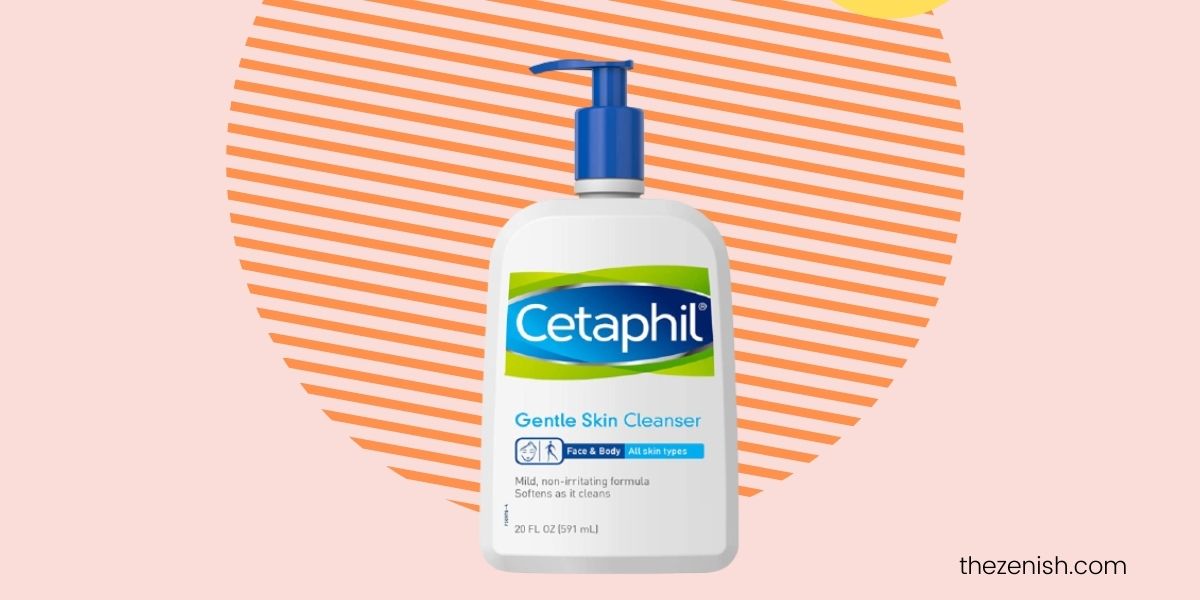
What Is Cetaphil and How Does It Work?
Cetaphil is a line of skincare products that was developed by a pharmacist in 1947. Cetaphil products are designed to be mild, non-irritating, and pH-balanced. They are suitable for sensitive skin and can be used daily. Cetaphil products include cleansers, moisturizers, lotions, creams, and wipes.
Cetaphil products work by gently removing dirt, oil, makeup, and bacteria from the skin. They also hydrate and soothe the skin, leaving it soft and smooth. Some Cetaphil products also contain active ingredients that can help treat and prevent acne, such as benzoyl peroxide, salicylic acid, and adapalene.
| this post may contain affiliate links, which means if you purchase from one of these links, I may receive a small commission at no additional cost to you. |
Cetaphil Products for Acne Prone Skin
So you want to know if Cetaphil is good for acne, right? Well, I’m here to tell you that it can be, depending on your skin type and what products you use.
Cetaphil has a bunch of products that are specially made for acne-prone skin, and they can help you keep your skin clean, moisturized, and protected. Let me tell you more about them:
Cetaphil PRO Acne Prone Oil Control Foam Wash
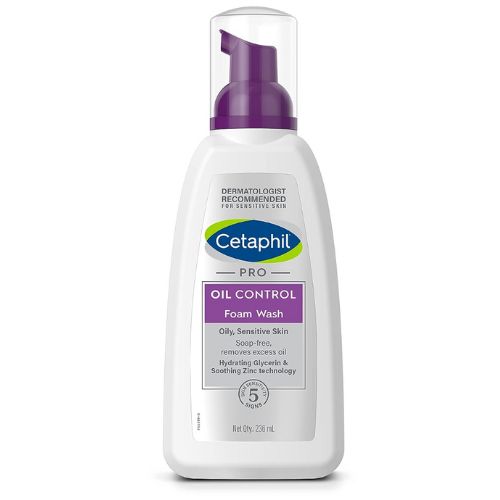
This is a foamy cleanser that helps reduce the oil and shine on your skin. It also has some ingredients that calm down the redness and inflammation that acne can cause. It’s great if you have oily or combination skin.
Cetaphil PRO Acne Prone Oil Free Moisturizing Lotion SPF 25
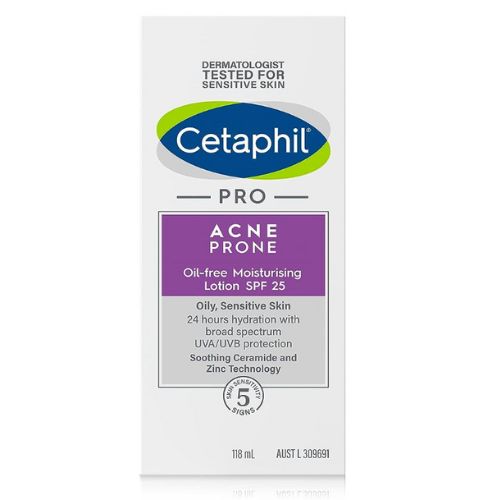
This is a lightweight moisturizer that hydrates your skin without making it greasy. It also has SPF 25, which protects your skin from the sun’s harmful rays. You know how important sun protection is, right? It can prevent wrinkles, dark spots, and even skin cancer. Plus, some acne treatments can make your skin more sensitive to the sun, so you need to be extra careful.
Cetaphil Daily Facial Moisturizer SPF 15
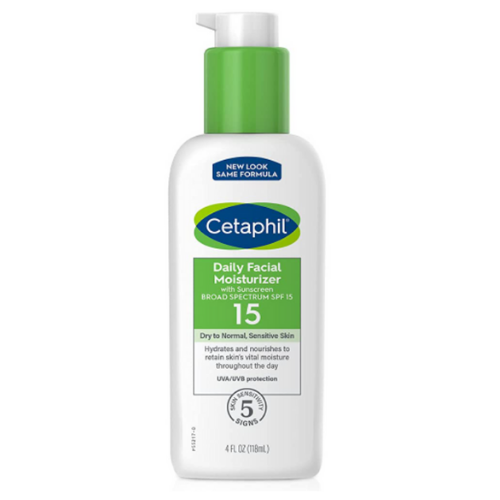
This is another moisturizer that has SPF 15, which is good for everyday use. It also has some ingredients that smooth and soften your skin. It’s suitable for all skin types.
Cetaphil Gentle Skin Cleansing Cloths
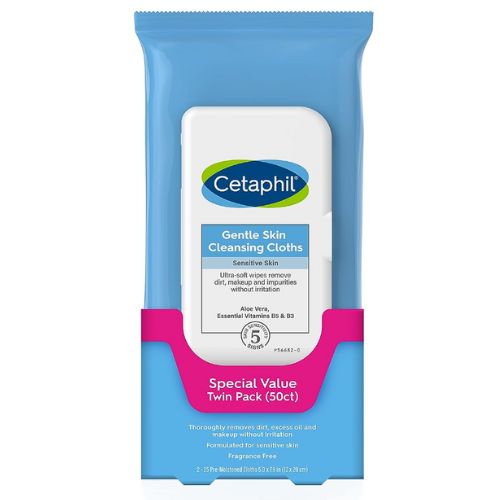
These are handy wipes that you can use to remove makeup and dirt from your face. They have some natural extracts that soothe and refresh your skin. They’re perfect for when you’re on the go or too lazy to wash your face (don’t worry, I won’t judge).
So, these are some of the Cetaphil products that can help you with acne. Of course, there are more products that you can check out on their website. But remember, not every product works for everyone, so you might need to experiment a bit to find what works best for you.
And if you have any questions or concerns about your skin, you should always talk to your doctor or dermatologist. They can give you more advice and prescribe you other treatments if needed.
Does Cetaphil Help with Acne? The Pros and Cons
Cetaphil products can help with acne in some ways, but they also have some limitations. Here are some of the pros and cons of using Cetaphil for acne:
Pros:
- Cetaphil products are gentle and non-drying, which can prevent your skin from getting irritated and produce more oil that can cause acne.
- Cetaphil products are hypoallergenic and non-comedogenic, which means they won’t cause any allergic reactions or clog your pores. That’s a big plus for acne-prone skin.
- Cetaphil products are fairly affordable and easy to find in drugstores and online. So you don’t have to spend a fortune or go hunting for them.
- Cetaphil products are recommended by many dermatologists as part of an acne treatment regimen. They can work well with other medications or treatments your doctor may prescribe.
Cons:
- Cetaphil products alone may not be enough to treat moderate to severe acne. You may need to use other medications or treatments your doctor may prescribe. For example, you may need to use topical or oral antibiotics, retinoids, or hormonal therapy.
- Cetaphil products may not work for everyone. Some people may have allergic reactions or sensitivity to some of the ingredients. For example, some people may be allergic to benzoyl peroxide, which is an active ingredient in some Cetaphil products.
- Cetaphil products may not address the root causes of acne, such as hormonal imbalance, stress, diet, or genetics. These factors can affect your skin health and cause acne breakouts. For example, some foods may trigger inflammation or increase oil production in your skin.
So, these are some of the pros and cons of using Cetaphil for acne. Of course, there are more factors that you need to consider, such as your skin type, your lifestyle, and your personal preferences. But I hope this gives you a general idea of what Cetaphil can do for your acne.
How to Use Cetaphil for Acne Effectively
Here’s what you need to do:
Wash your face at least once a day with a Cetaphil cleanser that suits your skin type.
You can choose from different types of cleansers, such as foam, gel, or cream. The important thing is to find one that cleans your skin without drying it out or irritating it.
To use the cleanser, just wet your face with lukewarm water and apply a small amount of the product. Then, massage it gently on your skin in circular motions. Rinse it off with water and pat your face dry with a clean towel.
Apply a thin layer of a Cetaphil moisturizer that contains SPF in the morning.
This will protect your skin from sun damage and keep it hydrated. Sun exposure can make your acne worse and cause dark spots and wrinkles, so you need to use sunscreen every day.
You can use a Cetaphil moisturizer that has SPF 15 or SPF 25, depending on your preference. To use the moisturizer, just squeeze a pea-sized amount on your palm and spread it evenly on your face, neck, and chest.
Apply a thin layer of a Cetaphil moisturizer without SPF at night.
This will nourish your skin and help it heal while you sleep. Your skin repairs itself at night, so you need to give it some extra care and hydration.
You can use the same moisturizer that you use in the morning, or you can use a different one that’s more suitable for nighttime. To use the moisturizer, just follow the same steps as above.
Use a Cetaphil cleansing cloth to remove makeup or dirt from your face during the day or before bed.
These are handy wipes that you can use to remove makeup, sweat, and excess oil from your skin. They have some natural extracts that soothe and refresh your skin. They’re perfect for when you’re on the go or too lazy to wash your face (don’t worry, I won’t judge).
To use the cleansing cloth, just take one out of the package and gently wipe it over your face. No need to rinse or dry.
Avoid using harsh or abrasive products on your skin, such as scrubs, toners, masks, or peels.
These can irritate your skin and cause more breakouts. Instead, stick to gentle products that are made for sensitive skin. If you want to exfoliate or treat your skin, you can use some products that contain active ingredients that can help with acne, such as benzoyl peroxide, salicylic acid, or adapalene.
These can help unclog pores, kill bacteria, and prevent new breakouts. But be careful not to overuse them or mix them with other products that may cause irritation or dryness.
Don’t pop, squeeze, or pick at your pimples.
This can cause infection, scarring, and hyperpigmentation. I know it’s tempting to get rid of those annoying zits but trust me, it’s not worth it. You’ll only make them worse and leave permanent marks on your skin.
It’s much better to leave them alone and let them heal on their own. If you have a big or painful pimple that won’t go away, you can try applying some ice or a warm compress to reduce the swelling and inflammation.
You can also use some spot treatments that contain ingredients like benzoyl peroxide or salicylic acid to speed up the healing process.
Consult your doctor
If your acne doesn’t improve or worsens after using Cetaphil products for several weeks. You may need to add other treatments to your routine. Sometimes, acne can be caused by factors that are beyond your control, such as hormones, stress, diet, or genetics.
These factors can affect your skin health and cause acne breakouts. In these cases, you may need to see a dermatologist who can prescribe you some medications or treatments that can help you with your acne. For example, you may need to use topical or oral antibiotics, retinoids, or hormonal therapy.
So, these are just some of the tips on how to use Cetaphil for acne effectively.
Alternatives to Cetaphil for Acne
If Cetaphil products don’t work for you or you want to try something different, there are other alternatives. Here are some of them:
Neutrogena Oil-Free Acne Wash
This is a cleanser that contains 2% salicylic acid, which helps exfoliate and clear the skin. It also has aloe vera and chamomile extracts, which help soothe and hydrate the skin.
CeraVe Acne Foaming Cream Cleanser
This is a cleanser that contains 4% benzoyl peroxide, which helps kill bacteria and prevent breakouts. It also has ceramides, hyaluronic acid, and niacinamide, which help restore the skin barrier and moisturize the skin.
Differin Gel
This is a topical gel that contains 0.1% adapalene, which is a retinoid that helps unclog pores and prevent new breakouts. Not only does it target acne, but it also works wonders to reduce the appearance of scars and dark spots.
The Ordinary Niacinamide 10% + Zinc 1%
This is a serum that contains niacinamide and zinc, which help reduce sebum production, inflammation, and blemishes. It also helps brighten the skin tone and improve the skin texture.
FAQ
Is Cetaphil Good for Acne?
Though Cetaphil cleansers don’t contain acne-fighting ingredients like alpha-hydroxy acids, salicylic acid, azalea acid, or benzoyl peroxide, they are formulated to remove dirt, oil, makeup, bacteria, sunscreen, and other impurities to unclog pores.
If you have oily skin and tend to get acne, consider using some of their new products from the Cetaphil PRO line formulated with zinc, which helps to remove dirt, oil, and other impurities that can clog pores.
Can Cetaphil cause acne?
Cetaphil is widely used and often recommended by dermatologists. However, some people have raised concerns regarding its potential to cause acne. Although there have been isolated reports of some people experiencing breakouts after using Cetaphil, scientific evidence does not support the claim that Cetaphil directly causes acne.
Your skin may react differently to certain products, and certain ingredients in Cetaphil might not be suitable for you.
Why do dermatologists recommend Cetaphil?
Cetaphil has been the leading dermatologist-recommended facial skincare brand for a long time. They work closely with medical experts to create products that your skin will love.
In fact, most of their products are formulated without any unnecessary ingredients and with your skin’s needs in mind, making them perfect for sensitive skin.
Dermatologists often recommend Cetaphil products for their gentle yet thorough cleansing, which is ideal for sensitive skin.
Dermatologists treat patients with conditions that can leave the skin highly irritated (think acne, rosacea, and eczema).
Cetaphil won’t make those skin conditions worse and will help keep the skin balanced. Also, most Cetaphil products don’t usually react negatively or interfere with prescribed medications.
Is Cetaphil good for oily skin?
Cetaphil offers products for all skin types but certain products will work better for oily skin.
Foaming cleansers like the Cetaphil PRO DermaControl Oil Removing Foaming Face Wash typically work well for combination and oily skin types, while a cream cleanser such as the Cetaphil Daily Facial Cleanser tends to work better for dry skin types.
The Daily Oil-Free Hydrating Lotion with Hyaluronic Acid in particular is lightweight, won’t clog pores, and is ideal for oily skin types.
Purifying clay masks like Cetaphil PRO DermaControl Purifying Clay Mask will deep clean and reduce the appearance of pores by absorbing excess oil.
Cetaphil is suitable for oily skin because it helps remove excess surface oils, dirt, and makeup.
It also leaves your skin feeling refreshed and does so without disrupting the delicate balance of your skin, which would result in your skin producing even more oil to compensate.
Is Cetaphil good for acne scars?
While Cetaphil products are not formulated to treat acne scars, they can be used to prevent spots from forming in the first place if you take care of your skin with effective cleansers and moisturizers.
Always remember to clean your skin before bed. It will remove any dirt, oil, sunscreen, and environmental debris from your skin which can cause acne and breakouts.
You may also want to try double cleansing before going to bed to achieve cleaner, smoother skin.
The first cleanse should remove makeup, sunscreen, dirt, and grease then follow with a second water-based cleanse to remove any leftover impurities on your skin.
Is Cetaphil expensive?
Cetaphil is one of the more affordable skincare brands out there and most of their products are available within that $10-$20 price range.
Though there are other affordable skincare brands that offer similar products such as Cerave, Aveeno, Vanicream etc.
How to Use Cetaphil Cleansers
Depending on the type of Cetaphil cleanser you have, you can use it in different ways.
The two most popular types of Cetaphil cleansers are the Daily Facial Cleanser, which must be rinsed with water, and the Gentle Skin Cleanser, which is mild enough to remove with a soft cloth.
Cetaphil cleansers are mild enough for you to use daily, morning and night. However, if you have extremely dry skin, then start by using it once per day to gauge how your skin reacts.
Add the cleanser after you wet your face and massage it (with your fingers, no need for a face cloth) gently into your skin.
Do this for at least 60 seconds or more then rinse with lukewarm water, and pat dry with a clean towel.
How do I know if Cetaphil is working for me?
Skin changes take time and it’s important to give anything new at least three months before assessing effectiveness.
They say change doesn’t happen overnight, but with skincare in particular it usually takes at least a month to see any major changes.
After at least three months, if you’re getting the desired results, then that’s one way to know it’s working. But if you’re unsure then try documenting the results.
You can do this by keeping a skin journal or diary and keeping notes of any noticeable changes to your skin after you’ve started using a product. You can even go a step further and take pictures to have visual proof.
Can you use Cetaphil moisturizer on acne?
Cetaphil is suitable for acne-prone skin and all the Cetaphil moisturizers are non-comedogenic, meaning they don’t cause pimples or other irritating problems to your skin.
The best Cetaphil moisturizer to try if you have acne is the Daily Oil-Free Hydrating Lotion with Hyaluronic Acid.
So Is Cetaphil Good for Acne? The Verdict
Yes, Cetaphil is fine to use if you have acne, it’s a great skincare brand that has a lot of products for different skin types. Specifically, some of their products are made to gently cleanse, moisturize, and protect your skin, which can be incredibly beneficial in managing acne.
But you know what? Cetaphil products may not be enough to treat moderate to severe acne or suit everyone’s preferences. Sometimes, acne can be caused by other factors that Cetaphil products can’t address. And some people may have allergic reactions or sensitivity to some of the ingredients in Cetaphil products.
If you do decide to use Cetapil for acne then talk to your doctor before using it and follow a proper skincare routine. You can also try other alternatives that may work better for your skin. You can check out some of the best acne treatments [here] or some of the best natural remedies [here].
I hope this helps and if you have any other questions, please feel free to ask. 😊



